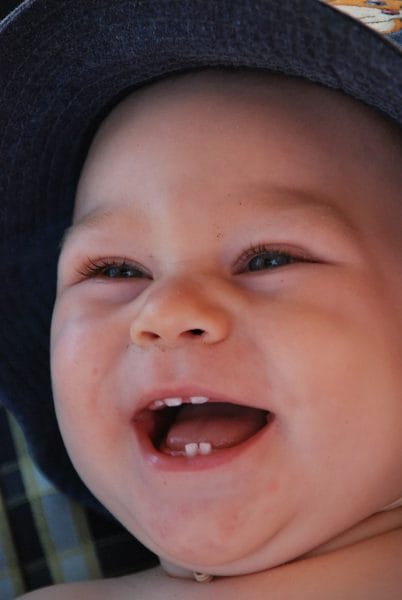Understanding 7-Month-Old Teething
Teething is a significant milestone in a baby’s development, and for many parents, it can be a challenging time. When your baby reaches the 7-month-old mark, you might start noticing signs of teething.
This article will explore 7-month-old teething, providing valuable insights and practical tips to help you navigate this phase with ease.

What Is Teething?
![]()
Teething is the process by which an infant’s first teeth, also known as primary teeth or baby teeth, emerge through the gums. This typically begins around 6 months of age, but every baby is different. Some may start teething as early as 4 months, while others might not see their first tooth until after their first birthday.
Signs of Teething in 7-Month-Olds
![]()
By the time your baby is 7 months old, you might notice several signs that indicate they are teething. Here are some common symptoms:
- Drooling: Increased saliva production is a classic sign of teething.
- Chewing on Objects: Babies often chew on toys, fingers, or anything they can get their hands on to alleviate gum discomfort.
- Irritability: Teething can make babies more fussy and irritable than usual.
- Swollen Gums: You might notice red, swollen gums where the teeth are emerging.
- Changes in Eating Patterns: Some babies may eat less due to sore gums, while others might want to nurse or drink more for comfort.
- Sleep Disturbances: Teething pain can disrupt your baby’s sleep schedule.
How to Soothe a Teething 7-Month-Old
![]()
While teething can be uncomfortable for your baby, there are several strategies you can employ to help soothe their discomfort:
- Teething Toys: Provide teething rings or toys that are safe for your baby to chew on. Chilled (not frozen) teething toys can provide extra relief.
- Cold Washcloth: A clean, cold washcloth can be soothing for your baby’s gums.
- Massage Their Gums: Gently rubbing your baby’s gums with a clean finger can offer temporary relief.
- Pain Relief: Over-the-counter pain relievers, such as infant acetaminophen or ibuprofen, can be used if recommended by your pediatrician.
- Distraction: Engaging your baby in playtime or other activities can help take their mind off the discomfort.
Case Study: Emma’s Teething Journey
![]()
To illustrate how teething can vary from one baby to another, let’s look at Emma’s experience. At 7 months old, Emma started showing signs of teething. Her parents noticed she was drooling more and chewing on her favorite stuffed animal. She became fussier, especially in the evenings, and her sleep was frequently disrupted.
Emma’s parents tried several methods to soothe her. They offered chilled teething rings, which Emma seemed to enjoy. They also found that massaging her gums with a clean finger provided temporary relief. After consulting their pediatrician, they occasionally used infant acetaminophen when Emma’s discomfort was severe.
With patience and care, Emma’s first tooth emerged within a few weeks. Her parents were relieved to see her discomfort gradually subside, and Emma’s cheerful demeanor returned.
When to Consult a Pediatrician
![]()
While teething is a natural process, there are instances where you should consult a pediatrician:
- If your baby has a high fever (above 101°F) along with teething symptoms.
- If your baby experiences diarrhea or vomiting.
- If you notice a rash that doesn’t improve or spreads.
- If your baby seems inconsolable despite trying various soothing techniques.
Your pediatrician can provide guidance and ensure there are no underlying issues contributing to your baby’s discomfort.
Myths About Teething
![]()
There are several myths surrounding teething that can cause unnecessary worry for parents. Let’s debunk a few common ones:
- Myth: Teething Causes High Fever: While mild fevers can occur, high fevers are usually not related to teething and should be checked by a doctor.
- Myth: Teething Leads to Diarrhea: There’s no scientific evidence linking teething to diarrhea. If your baby has diarrhea, consider other potential causes.
- Myth: Teething Requires Medication: Not all teething babies need medication. Natural remedies and comfort measures are often sufficient to manage discomfort.
Conclusion: 7-Month-Old Teething
![]()
Teething is a normal part of your baby’s growth, and the 7-month-old teething phase can be managed with understanding and care. By recognizing the signs of teething and employing effective soothing techniques, you can help your baby navigate this developmental milestone with greater ease.
Remember, each baby is unique, and what works for one might not work for another. Stay patient, consult your pediatrician when necessary, and celebrate the emergence of those adorable first teeth!
In summary, 7-month-old teething involves various symptoms like drooling, irritability, and changes in eating patterns. Utilizing teething toys, cold washcloths, and gentle gum massages can provide relief. Always consult a healthcare professional if you have concerns about your baby’s health. Understanding these aspects will help you support your baby through this exciting yet challenging period.





